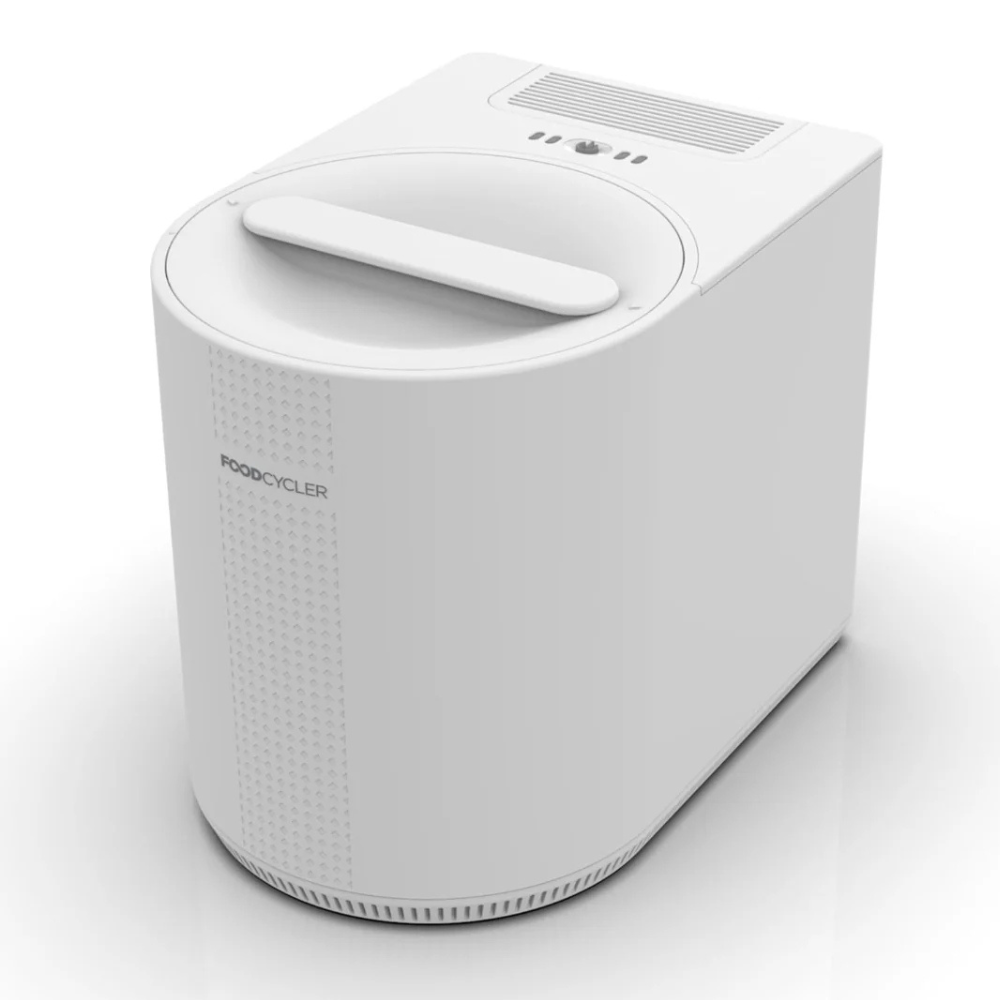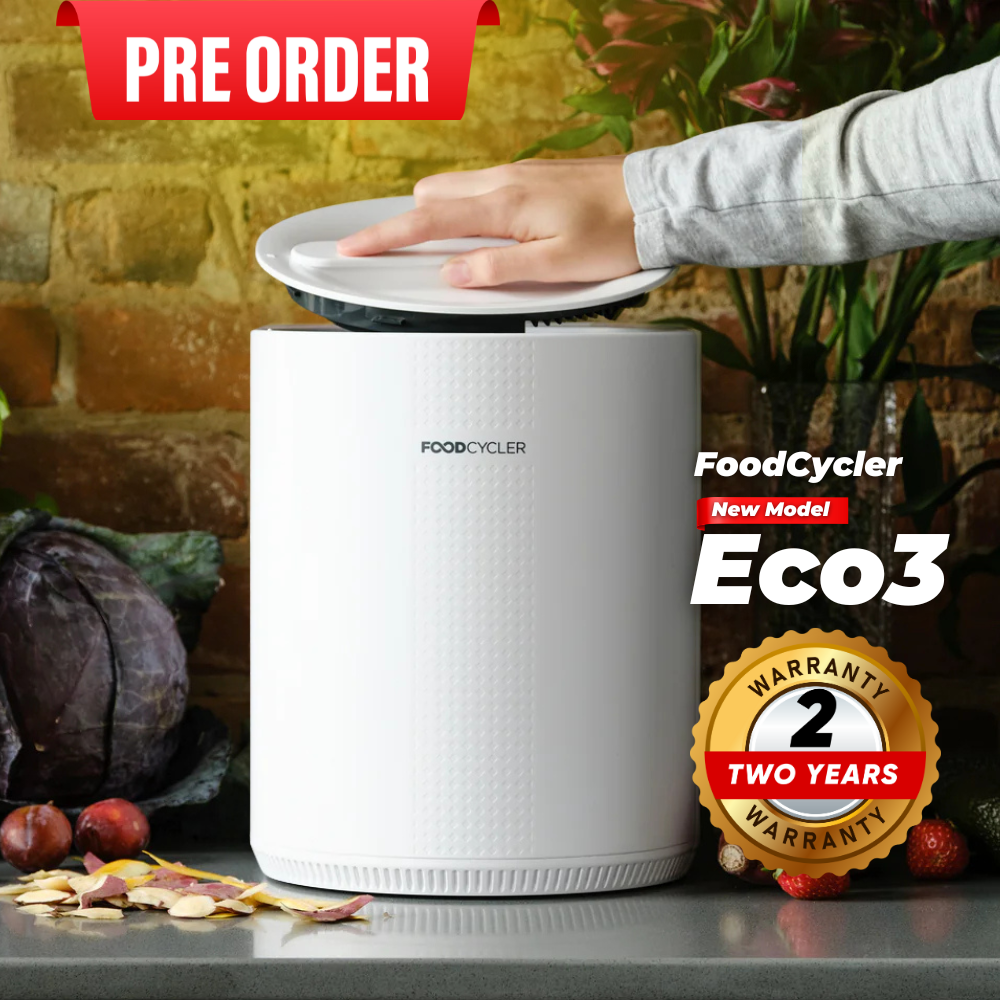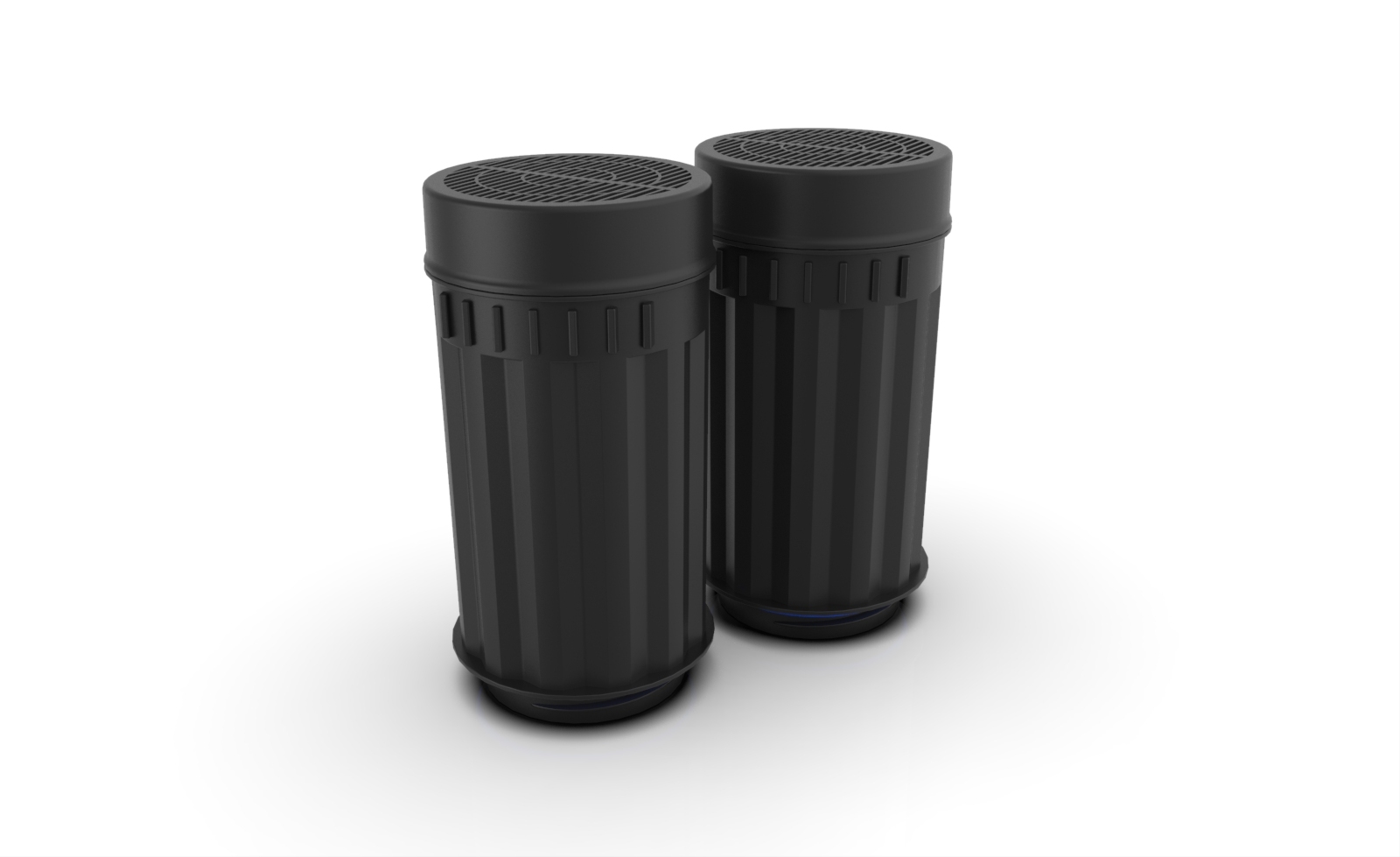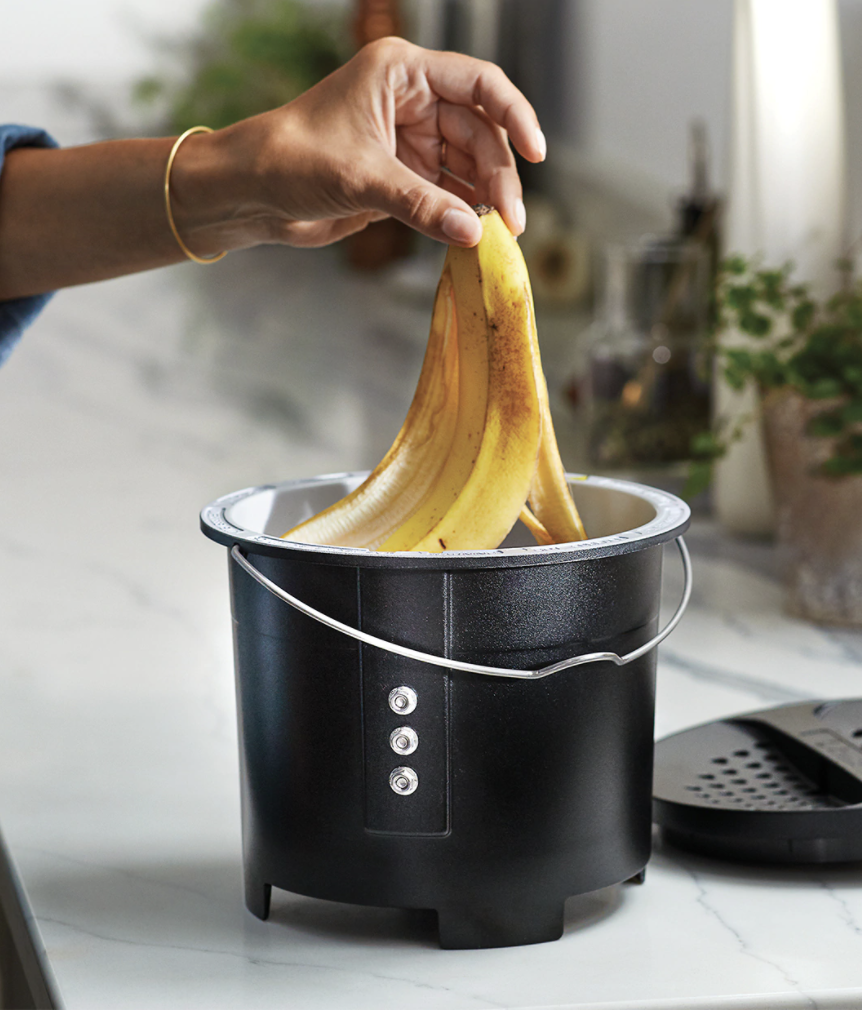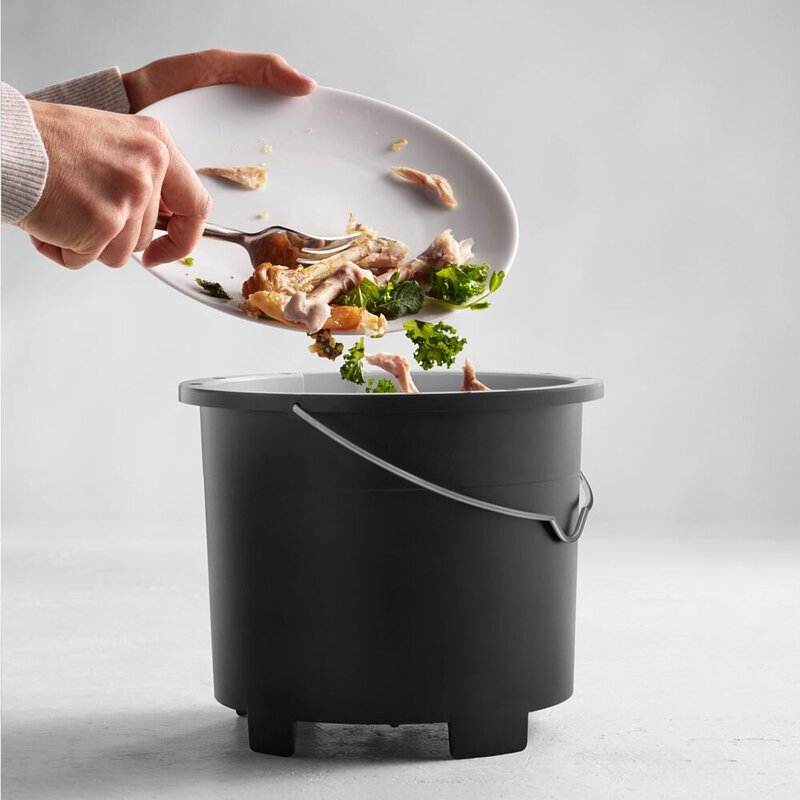What’s the specification of the FoodCycler FC-30?
- FC-30
- Bucket capacity: 2.5L
- Unit volume: Approx. 30.5L
- Recommended Household Size: 4
- Dimensions: (H) 36.1cm X (W) 28cm X (D) 32cm
- Progress indicators: 3 phase LEDs
- Processing time: 4-6 hours (overnight)
- Power consumption: Approx. 0.8kWh / cycle
- Filtration: 2 reusable filters
- Vent location: back
What can The FoodCycler process?
- Fruit and vegetable scraps
- Meat, shellfish, and poultry scraps
- Cheese, beans, seeds, and legumes
- Chicken and fish bones/shells
- Coffee grounds, filters, and tea bags
- Soft Dispose
What can’t The FoodCycler process?
- Hard, dense bones (beef, pork, lamb and bison)
- Candy or gum
- Cooking oils and greases
- Mangosteen
- Big portion of liquid
Cut up before cycling:
- Fibrous herbs & plants (celery, parsley, etc.)
- Corn cobs & husks
- Paper towels/tissue
- Pineapple leaves
- Whole fruits & vegetables
How much electricity does the unit consume?
For FoodCycler Malaysia, each cycle consumes approximately 0.8 kWh, which is roughly equivalent to having a desktop computer running for the same amount of time as the cycle.
The FoodCycler Malaysia FC-30 has built-in sensor technology that monitors the dryness and humidity of the food waste. Once complete, the unit will stop the cycle automatically.
How much food waste can the unit cycle at one time?
The FC-30 units have a 2.5 liter bucket capacity for food compost. We recommend keeping the contents not over the indicator line level to avoid jams.
How long does The FoodCycler cycle last?
FoodCycler FC-30 cycle takes between 4-6 hours (with an average of 4 hours) for the food waste to become completely dehydrated and processed.
The time needed depends on the amount of food waste being processed, the density of the food wastes and the moisture levels contained in each. Please note that these estimates exclude the unit's cooling time which lasts less than a half hour on average.
How long do the filters last?
The carbon filters last around 6 months with regular use, or 500 cycle hours. The life expectancy of the carbon filters is determined by the moisture content of the food waste, and the natural odours of the food waste. Denser, wetter and smellier food wastes will go through filters much faster than simple veggie scraps and egg shells.
Can The FoodCycler process bones?
The FoodCycler FC-30 can process fish and chicken bones. Large bones might cause jams on bucket grinding gears. All food waste will eventually become fertilizer use after the machine.
What are the 3 stages of the Cycle - Drying, Grinding, Cooling?
The Drying phase is focused on removing moisture from your food waste.
The Grinding phase continues the drying process, removing any remaining moisture, while the bucket grinding blades agitate and pulverize the food waste.
The Cooling phase is a safety measure to return the processed food waste to near-room temperature, making it safe to handle. Power usage is minimal during the cooling phase.
*PLEASE DO NOT SKIP THE COOLING CYCLE. It is for your safety and for the safe handling of your FoodCycler and grinding Bucket.
Can I add food waste to The FoodCycler once I’ve already started a cycle?
You can add additional food waste to the FoodCycler once the cycle has already begun, preferably early in the drying or grinding phases.
Adding food waste midway through the cycle may result in unprocessed food waste at the end of the cycle, as this extends the dehydration and grinding process. If this occurs, we recommend starting a second cycle until the food waste has been completely broken down.
Can I open the lid on The FoodCycler during the process to see what’s going on?
We advise that you keep the lid closed til the cycle is complete to prevent the cycle from being prematurely or improperly finished, or from lasting longer than usual.
The only exception is if you add more food waste to the unit while it is recycling, but we strongly recommend that you take care when opening the lid mid-cycle as the food waste and bucket get very hot during the process so it is strongly recommended to keep the lid shut.
Can I empty the bucket as soon as the unit finishes its cycle?
Once the unit beeps and/or shuts off following a cycle, the Bucket is safe to handle - though may still be quite warm. Please exercise caution when handling the bucket directly after a cycle.
Why is my FoodCycler emitting an odor?
The unit could be emitting an odor for a variety of reasons.
The carbon filters are required to ensure a near-odorless cycle. They last approximately 500 cycle hours, or 6 months with regular use.
Even if the ‘replace filter’ light has not gone on yet, you may need to switch out your filter carbon. Similarly, you can continue cycling even if the filter light has gone on and no odours are apparent.
Filter life is determined by the moisture quantity in the food waste, and the natural odorosness of each cycle. If you are cycling rotten, smelly or potent food wastes (such as rotten meat, or old cheese) your filters may not last as long as if you were cycling simple veggie scraps and coffee grounds.
How can I clean my FoodCycler grinding bucket?
The removable grinding bucket is dishwasher-safe. However, you don't really need to clean it at all! If the bucket is not jammed with processed food waste, you can simply continue to add food waste to the bucket and cycle as usual.
Any residue stuck to the bucket is almost always a cosmetic issue, and caused by the oil/grease or moisture content of the unit cycle. For an all-natural clean, try cycling citrus peels by themselves! This will also help to eliminate any trapped odors in the unit's ventilation system.
If dried food waste is stuck to the bucket, soak in warm soapy water to remove.
CAUTION: Do not reach your hand into the FoodCycler bucket, as the blades are extremely sharp.
What happens to the methane gases during the cycle?
Methane gas is emitted during the decomposition process of organic materials in an anaerobic ("no air") environment. Methane is 30 times more insulative of atmospheric heat than CO₂, and is therefore a huge contributing force to global climate change. Since the FoodCycler aerates the food waste while heating and pulverizing (an aerobic environment), those environmentally damaging methane gases are not produced at all.
How can I store my by-product (fertilizer)?
Your by-product or Fertilizer you reduce from the food waste in FoodCycler, can be stored after your cycle in an open-air container for a period of one week. After this one-week period, you can store the by-product for up to a year in a closed-top container, if preferred.
Can I run my FoodCycler in the garage?
Yes you can. But please be aware that, like most appliances, the FoodCycler is not intended to function in below-freezing temperatures. The FoodCycler must be in a closed, dry environment where there is no risk of it being rained on or otherwise subjected to the elements.
Can I recycle my filters/bucket?
FoodCycler products use a refillable filter system, which means that you can keep using your filters indefinitely and simply replace the carbon itself when they are ready to be changed. The filter carbon is a harmless organic material, and can be safely disposed of in your regular trash. Buckets can be recycled through your local metal scrap collection service.
What do I do if my FoodCycler is malfunctioning?
Prior to seeking customer support, we recommend that customers try a few troubleshooting steps on their own:
1. Manual Reset (manually shutting down the unit to reset to its original program settings)
2. Ensure that the unit is plugged in.
3. Press and hold the Start/Power button for three seconds, or until you hear a beep. The unit should shut off if it was “on”.
4. Unplug the unit and wait one minute.
5. Plug the unit back in and wait ten seconds.
6. Press Start/Power once, as you normally would to start a cycle.
7. You’re done! If the unit is still malfunctioning in some way, please contact FoodCycler’s Customer Support Team.

